News
Popular searches: Influenza, Childhood cancer, Endometriosis, Inflammation
-
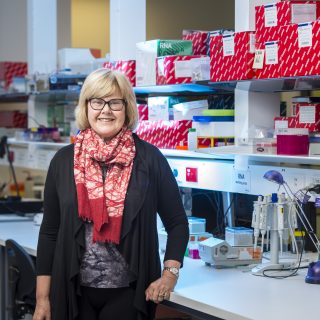
Leading next generation IVF
La Trobe University and Hudson Institute of Medical Research are leading pioneering research aimed at understanding infertility and improving the rate of assisted and natural pregnancies – an approach that may lead to ‘personalised IVF’. The team, led by Dr David Greening from La Trobe Institute for Molecular Science and Professor Lois Salamonsen from Hudson… Read more
-
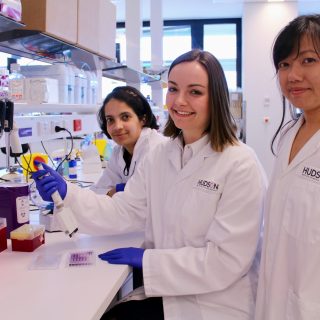
Childhood cancer ‘organoid’ program set to revolutionise treatment
The Hudson Monash Precision Medicine Program hopes to significantly improve treatment for childhood cancer patients with the greatest unmet clinical need – those diagnosed with brain cancers and solid tumours. Launched today (February 7) ahead of International Childhood Cancer Day on February 15, the two year program is being established with a $1.3 million investment… Read more
-

VCA Fellowship targets ‘rare and aggressive’ childhood cancer
Dr Jason Cain has been awarded a Victorian Cancer Agency (VCA) Mid-Career Fellowship for his research to help tackle a rare and aggressive form of childhood cancer. Dr Cain was one of 14 successful VCA funding recipients announced by Acting Minister for Health, Martin Foley as part of a $7 million investment by the Victorian… Read more
-
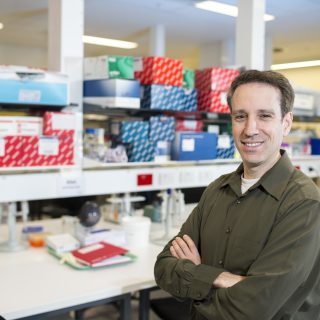
Cutting edge genome editing toolbox for precision medicine
A cutting-edge CRISPR library containing more than 36,000 molecular scissors targeting every known gene in the human genome is realising the clinical potential of precision medicine research at Hudson Institute. Hudson Institute scientists now have access to the award-winning Merck/Sanger Arrayed Whole Genome CRISPR Library on-site at the Monash Health Translation Precinct. Associate Professor Ron… Read more
-
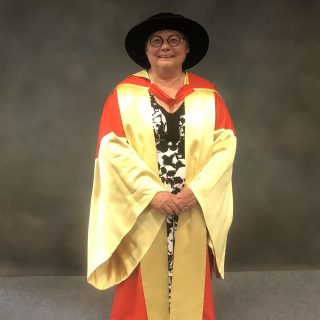
Professor Rosemary Horne awarded Doctor of Science
Professor Rosemary Horne has been awarded a Doctor of Science from Monash University for more than three decades of research that has shaped the understanding of sleep in children and infants. The Doctor of Science (DSc) is of a higher standing than a PhD and is awarded for work that makes an original, substantial and… Read more
-

Therapy brings long-term hope for halting Parkinson’s Disease
How deep brain stimulation therapy could help to slow or halt the progression of Parkinson’s Disease is the focus of new research by Dr Joohyung Lee, thanks to a grant from the Bethlehem Griffiths Research Foundation. “Parkinson’s disease (PD) is primarily associated with the inability to initiate and control voluntary movement. These symptoms result from… Read more
-

Simple blood test could decrease risk of stroke, heart attack
Australia’s largest study of a common yet underdiagnosed cause of high blood pressure is starting at Hudson Institute, with the aim of preventing heart attack and stroke. Primary aldosteronism (PA) is a potentially curable cause of high blood pressure (hypertension) caused by the over-production of the hormone aldosterone from the adrenal glands. If left undiagnosed,… Read more
-

Hudson Institute joins international paediatric cancer consortium
Hudson Institute scientists will share expertise with leading international research institutions to progress research and improve treatments for children and adolescents with brain cancer. Hudson Institute has been announced as the first Australian member of the US-based Children’s Brain Tumor Tissue Consortium (CBTTC) and joins a collaborative, multi-institutional research program dedicated to the study and… Read more
-
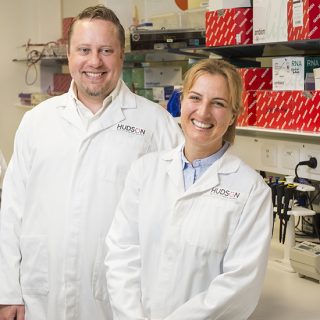
Stunning NHMRC Grant success
Hudson Institute has had outstanding success in the recent NHMRC Project Grant round. In addition, our researchers have been awarded an NHMRC Partnership Grant, an NHMRC Development Grant, an ARC Discovery Grant and three NMHRC Fellowships.… Read more
-

Linking a common stomach bug to gastric cancer
Why does a common bug, Helicobacter pylori, which is present in the stomachs of around half the world’s population, drive stomach cancer in some people? Associate Professor Richard Ferrero will establish how this seemingly innocuous bacterium drives growth of a specific type of stomach tumour, thanks to generous funding from the US Department of Defense.… Read more
